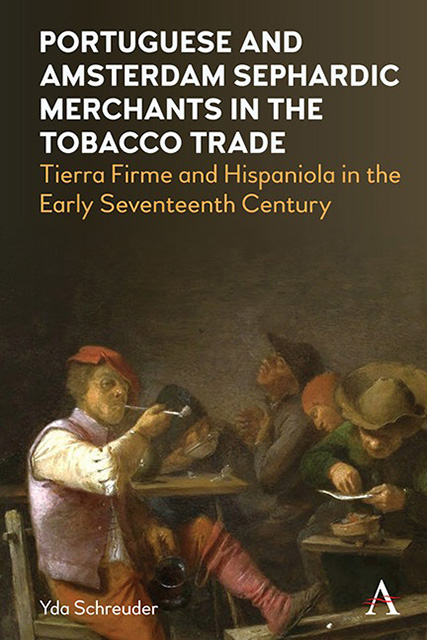 Portuguese and Amsterdam Sephardic Merchants in the Tobacco Trade
Portuguese and Amsterdam Sephardic Merchants in the Tobacco Trade Book contents
- Frontmatter
- Contents
- List of Figures
- Preface
- Chapter 1 Portuguese and Amsterdam Sephardic Merchants in The Tobacco Trade in The Early Seventeenth Century
- Chapter 2 The Contraband Tobacco Trade With Spanish America: Tierra Firme and Hispaniola
- Chapter 3 Portuguese Merchants and The Tobacco Trade With Tierra Firme
- Chapter 4 Portuguese Merchants and The Tobacco Trade With Hispaniola
- Chapter 5 Conclusion
- Bibliographic Notes
- Index
Preface
Published online by Cambridge University Press: 17 October 2023
- Frontmatter
- Contents
- List of Figures
- Preface
- Chapter 1 Portuguese and Amsterdam Sephardic Merchants in The Tobacco Trade in The Early Seventeenth Century
- Chapter 2 The Contraband Tobacco Trade With Spanish America: Tierra Firme and Hispaniola
- Chapter 3 Portuguese Merchants and The Tobacco Trade With Tierra Firme
- Chapter 4 Portuguese Merchants and The Tobacco Trade With Hispaniola
- Chapter 5 Conclusion
- Bibliographic Notes
- Index
Summary
The story of the tobacco trade in the Atlantic world in the late sixteenth and early seventeenth centuries is a story of entanglement among different merchant groups embedded in trans-imperial connections which transcended political or state boundaries and ethnic associations. The different participants in trade included European colonial settlers, native and indigenous people, run-away slaves, and merchants of various kinds and backgrounds and formed part of a network of contact that had developed over time engaged in tobacco cultivation, trade, and smuggling. In the story, I will focus on Portuguese merchants who straddled the Portuguese, Spanish, and North European maritime Atlantic world and Sephardic or Portuguese Jewish merchants who traded on behalf of the Dutch after they resumed Jewish identity with residency in the Dutch Republic. In some instances, the Sephardic merchants were the key link facilitating Dutch trade in particular in Amsterdam. A good example is Simon de Herrera, a Portuguese Jew who had connections and associations with both English and Dutch merchants and smugglers. He was captured in Hispaniola by the Spanish in 1596 and during the court case against him following his arrest it was discovered that he held documents which implicated him with Dutch interests and contacts as he was offered safe passage to Holland or Zeeland in the Dutch Republic. Being Jewish and charged with trading for the Dutch he became a target for the Inquisition. The Dutch were at war with Spain at the time which did not improve his chances to be let free. He was taken for trial in Mexico and executed in 1604. Herrera had likely been a factor or agent for a Dutch merchant who traded illegally with the Portuguese and Spanish in the Caribbean. Hispaniola had by then become a regular transfer point for Dutch, English, and French privateers engaged in the tobacco trade.
Contraband trade and war is all too familiar in the sixteenth and seventeenth centuries. In the case of the Dutch Republic, it were the circumstances dictated by the Eighty Years’ War with Habsburg Spain that explain how trade or exchange was conducted.
- Type
- Chapter
- Information
- Portuguese and Amsterdam Sephardic Merchants in the Tobacco TradeTierra Firme and Hispaniola in the Early Seventeenth Century, pp. vi - xPublisher: Anthem PressPrint publication year: 2023
